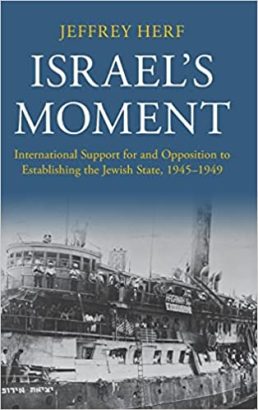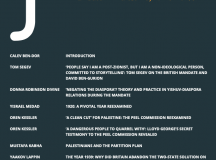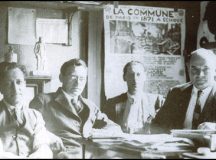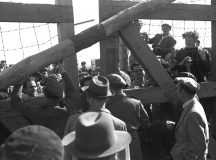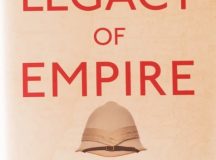Herf’s book forensically demolishes the myth that the West set out to create Israel to promote its interests. Rather, he demonstrates how fragile support for the Jewish state was within the West. That support was mobilised not by imperialist interests but by leftist forces who remained influenced by the anti-Nazi struggle. Israel owes its existence to a combination of social democrats and liberals in the West and the communist Soviet Union.
Israel was established on the cusp of the Cold War. Both the United States and the USSR supported the United Nations partition plan, which was the last time the superpowers would agree on a key strategic issue for decades. At the same time the Jewish struggle for self-determination against British Imperialism was supported diplomatically and militarily by the USSR and its satellites, a pattern that followed all subsequent anti-colonial revolts. It was simultaneously the last act of the war-time alliance and the first act of the Cold War. This is what Jeffrey Herf calls Israel’s Moment.
Herf’s compelling new book tells the story of this process mainly from the viewpoint of the United States but with critical material on France. He has mined government archives and the debates in the contemporary media. He demonstrates quite conclusively that the creation of Israel was not the result of an Imperialist plot. It was in fact created in the teeth of opposition from the United States diplomatic and security establishment, the US oil companies, the French Foreign Ministry and the British Labour government. Support for the Jewish state came mainly from progressive circles in the West and communist bloc.
Israel’s Moment explores a historical period that has become entangled in ideological revisionism. The United States, despite supporting the partition resolution, imposed an arms embargo much to the disadvantage of the Jews and then Israel (292-332). It also began to row back on partition suggesting a United Nations Trusteeship (281-283) and during the first Arab-Israel war thought Israel was unreasonable in not giving up the Negev to Transjordan (408-413). Today, of course, this is airbrushed from the record. The USSR on the other hand which had been the most consistent supporter of the creation of the Jewish state throughout this critical period soon began to erase this history as it embarked on the anti-Zionist campaign against Jewish communists in Eastern Europe and moved to ally with the Arab cause after the 1952 Egyptian Revolution. This dual turn by the superpowers has fed some on the left to believe that the United States was Israeli’s architect and the Soviet Union had always championed the Palestinians. Herf systematically produces evidence to show how the United States was at most a faltering ally of Israel and frequently tried to undermine it. The Soviet Union, on the other hand the most consistent and decisive supporter of the Jewish state in 1947 and 1948.
On 29 November 1947, the United Nations General Assembly adopted resolution 181 which provided for a sophisticated plan to partition British Mandate Palestine into two states, one Jewish and one Arab. The Jerusalem-Bethlehem area was to be internationalised and the three elements were to be united in economic union. The Soviet Union, previously hostile to Zionism, had changed its policy in the spring of 1947 and began to speak of the historical roots of Jews in Palestine. The USSR and its allies in the United Nations also made the connection between the Holocaust and the duty the international community had to ensure the safety of the Jewish people. Western states focused narrowly on the future government of Palestine and made no references to the Jewish people as whole and ignored the Holocaust. When I read the UN records myself, I was stunned to find that Western states so silent on the issue while tolerating antisemitic comments and certainly evidenced no sense of guilt for Jewish suffering.[1]
From the end of the Second World War the British Labour government continued the policy of its predecessor of imposing limits of Jewish immigration to Palestine. This meant that most Jews ‘liberated’ from Nazi concentration camps and death camps were prevented from reaching Palestine. As tensions between the war-time allies rose, western governments began to see such Jews as possible communist agents. In March 1947 Herf gives us insight into such attitudes when quoting a memorandum from the American consul in Berlin, Marshall M. Vance, who wrote ‘It is not easy to determine the reason for internment in Nazi concentration camps.’ (160) A month later James R Wilkinson, the American Consul in Munich was warning the State Department that there was ‘a beginning of what is planned to be a mass exodus of Jewish displaced persons from Germany to Palestine’ (162). As Herf points out these officials were writing against the background of the recently held Nuremberg Trials where the facts of the treatment of the Jews had been extensively publicised. Yet in these documents Jews were seen not as victims but as threats to US interests.
It was the US State Department where these interests were most articulated. In 1947 Secretary of State George Marshall appointed George Kennan as director of the Policy Planning Staff. Kennan had established himself as the architect of the US policy to contain communism.[2] In the Marshall State Department this became the strategic imperative, and a Jewish State in Palestine did not fit in to this policy as it would disrupt American relations with the Arab World, which would in turn threaten US political influence and energy supplies. Both Marshall and Kennan were opposed to supporting partition. After it was adopted, they then worked first to change the policy, by proposing a UN trusteeship to prevent the creation of a Jewish state, and when that failed to attempt to create the smallest and weakest state possible. In this they were aided by the British Labour government, which had exactly the same policy. In January and February 1948, Ernest Bevin, the Foreign Secretary had suggested to a Transjordanian delegation that in the event of an attempt to create a Jewish state, the British led and funded Arab Legion should intervene to seize the Negev and thus prevent the Jewish state’s access to the Red Sea. As with Marshall and Kennan, this policy was justified as preventing communist expansion.[3] Bevin and Marshall must have been pleased to read the UN mediator Folke Bernadote’s plan to hand the Negev to Transjordan during the 1948 war. In the event the new Israeli state prevailed due to their own efforts and the arms supplied by the Eastern Bloc. However, had it been left the State Department Israel’s territory would have much diminished by the handing over of strategic areas to a state it was at war with.
The American President Harry Truman emerges from this account not so much as man sticking to his principles as being in a constant war with his own officials. While he got his way on the UN partition vote, he had to settle for de facto recognition of the Jewish state – the USSR has recognised it de jure – the arms embargo and many attempts to weaken Israel. Indeed, as Herf explains, this coolness to Israel was to remain a State Department legacy for the 1950s and 1960s. When the US did decide to supply arms, they were rather old and not strategically significant. It was only after the 1967 war – won in part by the French mirage jet – that US policy began to change. The first serious consignment of US weapons did not arrive until 1972. Such facts are studiously ignored by those who think that Israel was a US Imperial project all along.
France has of course played a key role in Israel’s defence. The winning of the 1967 War was decisive for Israel’s continued existence and France’s role was key. At the same time the supply of nuclear technology – by French socialist ministers – has assured Israel’s longer-term security. Herf adds to our understanding of France’s pivotal role at the earlier stage. In a fascinating chapter on the role of the French government in facilitating Jewish immigration he shows how divisions between French ministers operated to the advantage of the Jews in displaced people camps. (192-222)
The French Foreign Ministry was opposed to the creation of the Jewish state on the grounds it would threaten relations with the Arab World. The French had long-term interests in the Levant (specially Lebanon and Syria) and still had colonies in North Africa. These relationships were seen as central to maintaining France’s international position. When Britain approached the Ministry for help in preventing Jewish immigration to Palestine, they found a sympathetic ear. Many assurances were given to the British that every effort would be made to prevent France from being used as a departure point for Palestine. However, in 1947 two key ministries were held by ministers with very different positions. Edouard Dupreux as interior minister and Jules Moch as transport minister were committed to the Zionist project. While Foreign Minister George Bidualt tried to help the British, the Minister of the Interior was generous in giving Jews visas to France, while the Transport Ministry issued certificates for the ships leaving Marseilles. As a result, tens of thousands of Eastern and Central European Jews left France for Palestine. They did not have visas to enter Palestine still controlled by the British but mostly for Latin American countries. For the British these Holocaust survivors were ‘illegal immigrants’ to be prevented reaching Palestine at all costs. Some did arrive but many more were turned back or put in detention camps – about 20,000 Jewish refugees were detained by the British in Cyprus alone. However, these French ministers succeeded in putting great pressure on the British, aided the Jewish cause and brought international public attention to the plight of Jewish refugees.[4]
Herf spends quite a lot of attention on Mufti Amin Al Husseini, the chair of the Higher Arab Committee, the Palestinian Arab leadership at the time. Al Husseini had been a collaborator with the Nazis in the Middle East and in Europe during World War II. He was a vicious antisemite and broadcast Nazi propaganda for several years. He helped the Nazis in their efforts to win support in the Muslim world. Herf argues that the future of the Middle East would have been better if Husseini had been put on trial. While he was under French ‘protection’ immediately after the war some in the US pressed for him to be indicted at Nuremberg. However, that was correctly ruled out by the American chief prosecutor, Justice Jackson, as the Tribunal only had jurisdiction over ‘major war criminals of the European Axis.’ It is unclear what Herf has in mind as a forum for the trial. I rather agree with David Motadel that Husseini was in fact marginal in the war.[5] I also think that Herf rather overestimates his role in the Middle East and Palestine in the late 1940s. The British would not allow him to return to Palestine. As a result, he had to conduct affairs from Cairo and Beirut which meant other members of the Committee were meeting Husseini outside the country during critical periods. Inside Palestine the Arab population was at a national level virtually leaderless. At the same time, he could not travel to the United Nations, then in upstate New York and had left the diplomatic leadership, such as it was, to others. Husseini was a weak leader who was effectively subordinated to a minor role by the Arab League. He rejected partition and thus the Arab state in Palestine, promoted a doomed military campaign and delivered not liberation but statelessness and occupation. Herf seems to think that a trial – and presumably a conviction – would have discredited him to his followers. More likely it would have turned him into a martyr.
The importance of Herf’s book lies in the manner that it forensically demolishes the myth that the West set out to create Israel to promote its interests. Rather, he demonstrates how fragile support for the Jewish state was within the West. That support was mobilised not by imperialist interests but by leftist forces who remained influenced by the anti-Nazi struggle. Israel owes its existence to a combination of social democrats and liberals in the West and the communist Soviet Union. In their different ways during Israel’s Moment these forces opposed the colonial policies of Britain and France, the reactionary regimes in the Arab world and US diplomatic and security elites and the oil companies. That they prevailed was not a foregone conclusion. As Herf says his study ‘draws attention to the contingent meanings of famous oppositions such as “left and right,” progressive and reactionary, imperialism and anti-imperialism, fascism and anti-fascism, racism and anti-racism in the late 1940’s in connection with the Zionist project.’ (p. 7). As a result, while this is a fine work of history it also makes a rich contribution to contemporary debates. Anyone concerned with the Middle East will need Herf’s book on their shelves.
References
[1] See John Strawson, Partitioning Palestine: Legal Fundamentalism in the Palestinian-Israeli Conflict (London and New York: Pluto Press, 2010), p.5 and pp.73-75.
[2] Kennan was the author of the famous Long Telegram in 1946 which initiated the policy.
[3] See Benny Morris, The Road to Jerusalem: Glubb Pasha, Palestine and the Jews (London and New York: I.B. Tauris, 2002), p.113.
[4] This was especially the case with the Exodus affair which Herf discusses on pages 167-172.
[5] See David Motadel, Islam and Nazi Germany’s War (Cambridge Mass. and London: Belknap Press of the University of Harvard Press, 2014), pp 41-44.

